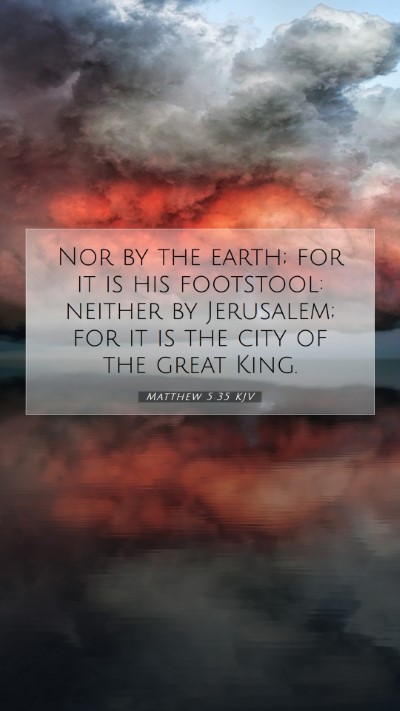Bible Verse Meaning of Matthew 5:35
Matthew 5:35 states: "Nor by the earth; for it is his footstool: neither by Jerusalem; for it is the city of the great King."
Summary of Insights
This verse comes from the teachings of Jesus during the Sermon on the Mount, where He addresses the gravity of oaths and the proper way to approach promises made. The discussion emphasizes that swearing by the earth or significant cities does not lend legitimacy to one’s words. Instead, Jesus highlights the importance of integrity in speech.
Commentary Insights
Matthew Henry's Commentary
Matthew Henry interprets this verse as a reminder that God's name and the things related to Him are sacred. He notes that swearing by creation itself diminishes the honor due to God, as the earth and Jerusalem belong to Him. The emphasis is on a believer's character that should be trustworthy enough that no oath is needed.
Albert Barnes' Notes
Albert Barnes further elaborates that the phrase "the earth is his footstool" indicates God's authority over the globe and that any attempt to swear by it is futile. He points out that Jesus encourages simplicity in promises, suggesting that a simple 'yes' or 'no' should suffice without resorting to oath-making.
Adam Clarke's Commentary
Adam Clarke emphasizes the need for sincerity and truthfulness in our words. He argues that swearing is often seen as an endorsement of honesty when, in reality, true integrity should be inherent in the believer's character. Clarke states that believers should strive for a standard where their word is always reliable, negating the need for oaths.
Historical Context and Application
In understanding Matthew 5:35, it's essential to consider the historical context of oaths in Jewish culture. At that time, people often invoked oaths to add credibility to their statements due to a lack of trustworthiness. Jesus challenges this practice, calling for a radical transformation of how His followers communicate and engage in relationships.
This verse teaches modern readers about the significance of integrity and honesty, reminding us that our character should reflect our faith. In a world where words can often be cheap, this scripture profoundly challenges individuals to hold themselves to a higher standard of truthfulness.
Key Themes
- Integrity in Communication: Emphasizing that believers should always speak truthfully.
- God’s Sovereignty: Recognizing that everything belongs to God, and therefore, swearing by His creation is unnecessary.
- Character Over Claims: Encouraging Christians to build reputational integrity over legalistic or ritualistic claims.
Bible Verse Cross References
- James 5:12: Advises against swearing oaths and stresses the importance of honest speech.
- Matthew 23:16-22: Discusses the folly of swearing by the temple and altar and their relation to God.
- Psalm 24:1: Declares the earth and everything in it belongs to the Lord, reinforcing the message in Matthew 5:35.
Conclusion
In understanding Matthew 5:35, one finds a compelling call to embody truth and sincerity. As believers engage in Bible study, contemplating this verse alongside other scriptures can enhance their bible verse understanding and bible verse interpretations. In an age marked by constant communication, the lessons from this verse remain relevant, urging individuals to uphold a standard of authenticity in all they say and do.
By studying this verse, individuals can gain deeper bible study insights and apply them to their daily lives, ensuring that their words truly reflect their faith.


